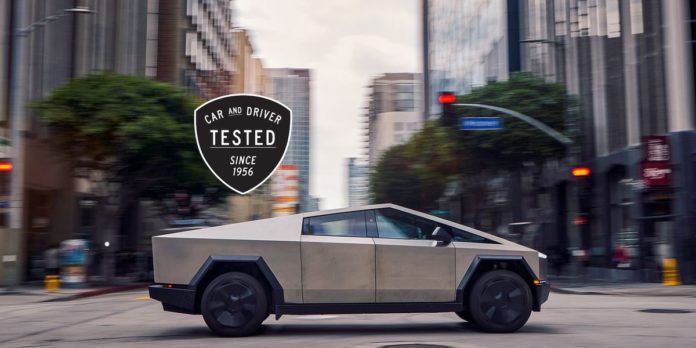- The 2024 Tesla Cybertruck is more aerodynamic than it looks, and it’s roll-top tonneau cover plays an essential role.
- We tested the Cybertruck with the top open and closed; the latter position provided a 10 percent improvement in consumption during our 75-mph steady state test.
- Our tests show the Cybertruck’s real-world range drops from 250 to 225 miles with the top open; driven at 65 mph with the top closed, we predict a range of 295 miles.
The Tesla Cybertruck is more friendly to the air than you might imagine. The front end was always going to be a challenge, but the prototype’s flat nose was changed to a subtly curved front panel that helps the air bend around the forward flanks. What’s more, the front flares have been carefully shaped to create a small, deliberate vortex that helps to further encourage the flow to bend smoothly around those abnormally sharp front corners. The prominent wiper acts like a fence that directs air over the top instead of allowing it to swirl down onto the driver’s window, so wind noise isn’t as turbulent as you might guess—for the driver, at least. Underneath, the Cybertruck’s belly is much smoother than any ladder-framed truck could ever hope to be, with minimal openings and fairings to smooth the flow over the suspension’s lower control arms.
Arguably the most surprising aspect about the Cybertruck’s aerodynamics is how naturally well-suited the angular-looking aft end actually is. The rearmost flanks taper gently like some kind of raindrop, which is the most naturally aerodynamic shape. Thing is, the abrupt truncation at the tailgate is actually quite good aero-wise. Wunibald Kamm (of Kammback fame) once demonstrated that such an abrupt cut-off would essentially trick the majority of the air flowing over such a body into continuing on a laminar path, thereby reducing drag more than a smoothly rounded design might achieve.
Of course, the Cybertruck’s roll-top tonneau cover is essential to all of this, so we conducted 75-mph steady state tests with the tonneau closed, open, and with the tonneau and tailgate open together to presumably create an exit for the air “captured” by the exposed bed. We also wondered about the effect of the wheel caps, so we repeated our tonneau-closed runs with them off.
We tested the Cybertruck’s 834-hp tri-motor Beast model on 35-inch all-terrain tires, and ran it in the configurations mentioned above around a 6.6-mile oval track so we could eliminate any wind effects, which would have been significant for straight-line testing because it was a very breezy day, and we reset and recorded the truck’s internal cumulative consumption meter as we passed by a fixed marker on the track. The meter outputs real-time consumption in watt-hours per mile to three digits, and we recast this number in kilowatt-hours per 100 miles, which is a more standard format of this consumption unit.
The result? Consumption averaged 58.3 kilowatt-hours per 100 miles with the tonneau closed versus 64.2 kWh/100 mi with it open. This 10 percent increase in consumption suggests our 250-mile range test result would have been 225 miles with the tonneau open. Opening the tailgate at this point didn’t represent a meaningful change, as that measured 64.0 kWh/100 mi. Meanwhile, running with the wheel covers removed and the tonneau closed amounted to a tiny loss of just 1.7 percent: 59.3 kWh/100 mi instead of 58.3 kWh/100 mi.
Aerodynamic drag obviously changes drastically with speed, so we repeated some of our runs at 65 mph. Consumption dropped from 58.3 kWh/100 miles to 49.3 with the tonneau closed. That’s a 15.4 percent reduction in consumption that suggests a 65-mph range of some 295 miles. Velocity-related aero benefits are consistent across a range of configurations, so it’s no surprise that our 65-mph bed-exposed run improved by a similar 15.6 percent, consuming just 54.2 kWh/100 miles at 65 mph instead of 64.2 at 75 mph.
Moral of the story: run with the tonneau closed. It’s more efficient, and the visibility “benefit” of the inside rear-view mirror isn’t all it’s cracked up to be because the view is way too pinched and slot-like. The camera system does a better job, as it turns out. And if you can run a few mph slower, do that too if you want to further boost your available range.
Dan Edmunds was born into the world of automobiles, but not how you might think. His father was a retired racing driver who opened Autoresearch, a race-car-building shop, where Dan cut his teeth as a metal fabricator. Engineering school followed, then SCCA Showroom Stock racing, and that combination landed him suspension development jobs at two different automakers. His writing career began when he was picked up by Edmunds.com (no relation) to build a testing department.

